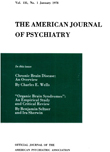ECT and ethical psychiatry
Abstract
The author discusses the right to receive ECT and describes voluntary and involuntary patients for whom the treatment seemed both ethical and humane. The right to refuse ECT must be respected in competent patients. However, problems arise when patients' decision-making ability is compromised by their illness. Informed consent questions include how much and what type of information patients should receive and how much those with disordered cognitive functioning can be expected to understand. The author believes that ECT should be fully voluntary whenever possible and that a court-appointed guardian should make such treatment decisions for incompetent patients.
Access content
To read the fulltext, please use one of the options below to sign in or purchase access.- Personal login
- Institutional Login
- Sign in via OpenAthens
- Register for access
-
Please login/register if you wish to pair your device and check access availability.
Not a subscriber?
PsychiatryOnline subscription options offer access to the DSM-5 library, books, journals, CME, and patient resources. This all-in-one virtual library provides psychiatrists and mental health professionals with key resources for diagnosis, treatment, research, and professional development.
Need more help? PsychiatryOnline Customer Service may be reached by emailing [email protected] or by calling 800-368-5777 (in the U.S.) or 703-907-7322 (outside the U.S.).



